How to Use Chamomile Tea for Sleep
There’s nothing quite as relaxing as sipping a soothing, hot cup of tea before bed. But did you know that the type of tea you’re drinking could also help ease your worries and make it easier to fall asleep at night?
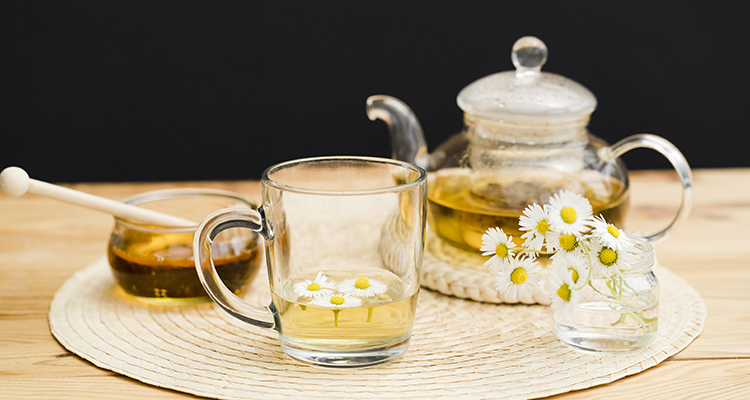
Every herbal tea serves its own unique purpose. For example, if you’re looking for a morning “pick me up”, Early Gray or English Breakfast Tea are great choices thanks to their high caffeine content. If instead, you’re looking to wind down after a long or stressful day and need help drifting off to sleep, chamomile tea can help.
Keep reading to learn all there is to know about this delicious, fragrant, and beneficial tea and how it can help you fall asleep faster and sleep better.
Content
What is Chamomile Tea?
Chamomile tea is made from the chamomile herb, which is derived from a daisy-like flower. Chamomile is part of the Asteraceae plant family and has been used for centuries as a healing herb thanks to its natural ability to ease symptoms associated with various health conditions. These include but aren’t limited to
- Inflammation
- Hay fever
- Muscle spasms
- Menstrual disorders
- Wounds
- Insomnia
- Gastrointestinal disorders
- Hemorrhoids
- Rheumatic pain
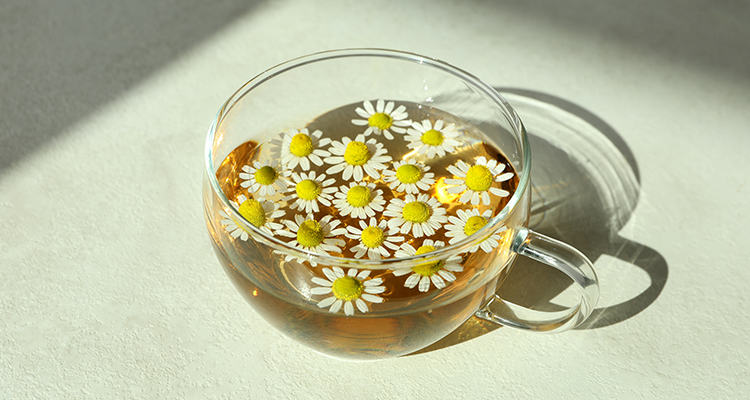
Ancient Romans, Greeks, and Egyptians all praised the chamomile flower for its soothing, medicinal properties which are still used and revered today. The word “chamomile” is derived from the Greek word that means “earth apple” (khamaimēlon). This is due in part to the tea’s mildly sweet flavor that many describe as “a mellow sweetness with undertones of apple and honey”. It’s also been described as “silky” and “delicately floral”.
The word “chamomile” is sometimes used to describe a wide variety of flowering plants, however, the chamomile flower used to make tea is usually derived from either the German or Roman Chamomile plant. In addition to tea, these chamomile plants are used to make wine, beer, and essential oils.
The type of chamomile tea you find in stores and tea shops today is most often grown and derived in Egypt. It’s extremely high-quality thanks to its natural sweetness and soothing properties. Chamomile used in traditional tea bags and sachets are usually made from leftover tea leaves particles including dust and fannings. High-quality chamomile tea bags and tea leaves are produced using large, fragrant flower heads and provide strong, exceptional flavor.
Chamomile tea is easy and inexpensive to make. Different parts of the flower head are dried, packaged, and then infused in hot water. If you choose to use the fresh tea leaves, you’ll need a heaping teaspoon for every six ounces of hot water. When purchasing full-flower chamomile tea you’ll notice that the leaves are very light and fluffy, which means you may need more than a teaspoon to achieve the strong flavor you’re after. Prepackaged tea bags or sachets can’t be altered, however, they still deliver a delicious and soothing cup of chamomile tea.
Why Does Chamomile Tea Make You Sleepy?
Chamomile tea is not only soothing and delicious but it’s also therapeutic. The chamomile plant and teas made from the herb are said to have sedative properties and act as a mild tranquilizer and sleep-inducer. Research shows that chamomile contains the flavonoid apigenin which binds to GABA receptors in the brain. These receptors promote sleepiness and may help combat symptoms associated with insomnia and other common sleep disorders. Chamomile may also have CNS depressant effects and work as an anticonvulsant in patients suffering from epilepsy.

GABA receptors are the same ones that bind to benzodiazepines which are commonly found in anti-anxiety drugs and antidepressants due to their calming effects. When apigenin in chamomile binds to these receptors, they trigger sedative, relaxing effects which are perfect for those struggling to fall and stay asleep or reduce stress at night.
Preparing Chamomile Tea Before Bed
There are several ways to prepare and consume chamomile tea at night or before bed, depending on your preference and needs. When used to induce sleepiness, experts suggest drinking a single cup of chamomile tea between 45 and 60 minutes before bed. This gives your body ample time to metabolize the tea and time for the chemical compounds that provide the sedative benefits to take effect.
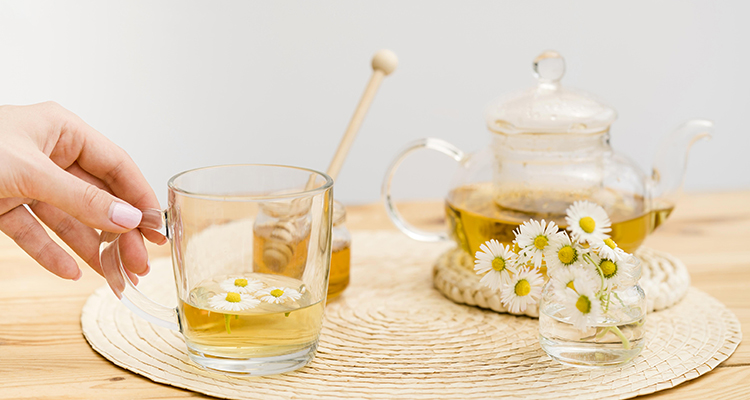
Plenty of companies produce chamomile tea and chamomile blends in convenient and easy to use tea bags. Simply boil water and slowly pour it over the tea bag in your favorite mug or tea cup. Let the tea steep for 2 to 7 minutes. The longer it steeps, the stronger the flavor. If you want a more authentic tea drinking experience, you can use the actual chamomile flower to make both hot and iced tea. Simply place the flower into a glass or small teapot and cover them with hot water. Let the flowers steep for up to 5 minutes before straining the tea and adding your favorite sweetener. Honey is a great way to naturally sweeten your chamomile tea. Plus, honey has other added health benefits including anti-anxiety and antidepressant properties that might help promote sleep in certain people.
Other delicious chamomile blends include chamomile vanilla, chamomile honey, and chamomile lavender. This last one may be especially beneficial for treating insomnia since lavender is credited for promoting calm, relaxation, and sleep.
You can incorporate drinking chamomile tea into your nighttime routine. Brew a cup about 60 minutes before bed and enjoy it while reading, writing in your journal, taking a warm soothing bath, or listening to calming music. Creating a nighttime routine that includes drinking chamomile tea is a great way to prepare your brain and body for sleep and improve your overall sleep quality. By performing these same acts at the same time each night, they act as triggers for sleep. Your body will associate drinking chamomile tea and journaling with bedtime. These activities can also help reduce stress and anxiety at night – two leading causes of insomnia in most people.
The Many Benefits of Chamomile Tea
Chamomile tea’s sleep-inducing benefits are just one reason to incorporate this herbal tea into your daily routine. In addition to providing calming and relaxing benefits that might make it easier to fall and stay asleep, chamomile’s properties can help ease other symptoms that may be triggering your insomnia.
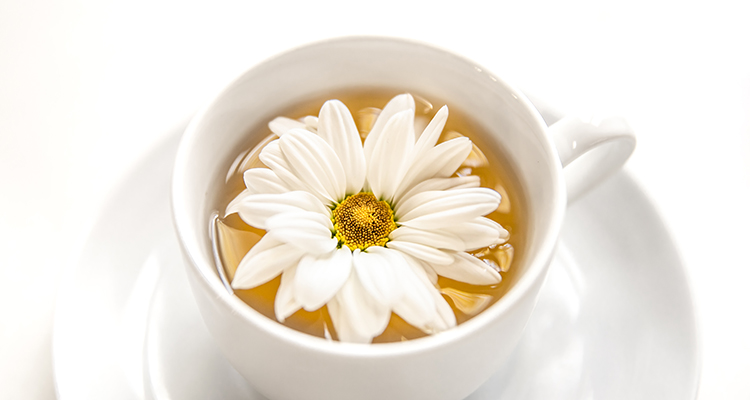
Here are a few more amazing benefits of chamomile tea to consider.
Reduce Inflammation and Pain
If chronic pain due to inflammation is keeping you up at night, the properties found in chamomile tea may help. The chamomile flower is said to have anti-inflammatory properties which may reduce joint pain and discomfort in some people. This is especially true in patients suffering from chronic anti-inflammatory conditions like arthritis. Reducing inflammation and pain make it easier for pain sufferers to find a comfortable sleep position, fall asleep faster, and achieve uninterrupted sleep.
Eases Cold Symptoms and Congestion
Nasal congestion can make it hard to breathe and even harder to fall and stay asleep. When you lay down, your airway becomes restricted and mucus is more likely to build in your throat and nasal passages. Not only can this lead to increased congestion but also snoring, both of which can cause frequent awakenings.
Chamomile tea is said to not only reduce congestion but also treat other pesky cold symptoms like sore throats, hoarseness, and headaches. By easing these cold and flu symptoms many insomnia sufferers find it easier to achieve quality sleep. Add a few drops of honey to your tea to coat your throat and experience added relief. Honey also has antimicrobial properties which may help fight off whatever infection you’re facing.
Strengthens the Immune System Against Certain Cancers
Similar to honey, the chamomile plant also contains antimicrobial and antibacterial properties which may benefit certain types of cancer patients by giving their immune systems a much-needed boost. These healing properties can help ward off illness and strengthen the immune system, promoting faster healing and recovery.
The antioxidants found in chamomile tea may also reduce the risk of certain types of cancer, although research on its effects is still ongoing. Scientists believe that the antioxidant apigenin is highly efficient at fighting cancer cells, especially those found in the digestive tract, uterus, prostate, and breasts. One study also showed that out of 537 people who drank chamomile tea between 2 and 6 times per week were less likely to develop thyroid cancer than those who never drank the herbal tea. While these results are promising, more research is needed to determine how big a role chamomile tea plays in cancer prevention.
Improves Cardiovascular Health
Heart health plays an important role in all of your bodily functions, including the ability to achieve quality sleep. Chamomile tea contains certain chemical compounds that are said to improve heart health, promote healthy heart function, and reduce the risk of developing certain cardiovascular conditions including heart disease.
Research on just how chamomile benefits the heart is still ongoing, but certain studies suggest it may offer relief for conditions like coronary heart disease. One reason is that chamomile is packed with myriad flavones, an important group of antioxidants. Flavones are also linked to reduced blood pressure and cholesterol levels, which are both prerequisites for heart disease.
Reduces Anxiety and Depression Symptoms
Anxious thoughts and depression symptoms are two of the leading causes of insomnia in many people. These conditions are also bilateral. Anxious thoughts can make it difficult to fall asleep, whereas the inability to fall asleep can also trigger anxiety. The same can be said for depression. Chronic sleep deprivation can increase your risk of developing depression, while an overwhelming sense of sadness can make it increasingly difficult to achieve the deep, restorative sleep you need to maintain a healthy hormonal balance.
Chamomile tea may help ease symptoms associated with both anxiety and depression, depending on their severity. Studies suggest that chamomile’s ability to attach to GABA receptors in the brain can alleviate stress and anxiety while also promoting an overall sense of relaxation and well-being. This soothing and aromatic tea could trigger feelings of happiness and calm, combatting any sense of sadness or anxiety you feel. The plant itself also contains compounds that help calm both your mind and body, making it easier to fall and stay asleep.
Improves Digestion
Countless digestive issues can keep you up at night from gas and bloating to indigestion. Chamomile’s soothing properties may help ease your discomfort, making it easier to fall asleep and reducing the number of times you wake up. Simply drinking a soothing cup of chamomile tea before bed can promote healthy digestion, reducing bloating, uncomfortable gas, and diarrhea. Chamomile tea may also reduce the risk of other, more serious, gastrointestinal conditions thanks to its anti-inflammatory properties.
If you suffer from heartburn, indigestion, or acid reflux, chamomile tea might benefit you as well. One study conducted on rats showed that chamomile reduces stomach acidity, helping prevent stomach ulcers while also inhibiting the growth of dangerous bacteria in the gut attributed to ulcer development. While more research on the effect of chamomile tea on human digestion is needed, its chemical properties are often used to ease digestive discomfort and ailments including painful gas, nausea, and diarrhea.
Helps Control Blood Sugar
Some studies show that chamomile tea may lower blood sugar levels which are attributed to diabetes, obesity, and other serious health complications. Chamomile’s anti-inflammatory properties may also prevent cell damage in the pancreas, which is a common side effect of high blood sugar levels. The pancreas is where your body produces insulin, the hormone responsible for safely and efficiently removing sugar from your blood. A compromised pancreas could lead to higher than normal blood sugar levels, a marker for type 2 diabetes.
One study if diabetic patients indicated that participants who consumed chamomile tea on a daily basis for 2 months saw a significant decline in blood sugar levels over those patients who only drank water during the same 8-week period. Other animal studies suggest that chamomile tea may prevent dangerous spikes in blood sugar levels after eating and could lower fasting blood sugar levels.
Potential Side Effects of Chamomile Tea
It may be hard to believe that such a gentle and soothing tea could have adverse side effects but this is the case for some people. In most cases, consuming chamomile tea is completely safe for adults, teens, and even children. However, in rare cases, some unpleasant side effects have been reported.

Some people may be unaware that they have a chamomile allergy. This is most common in those with other allergies or sensitivities to daisies and other plants in the daisy family including chrysanthemums and ragweed. Some cosmetic products that contain chamomile may irritate a person’s skin or eyes, creating eye inflammation or pink eye (conjunctivitis). If you have any of these allergies, check with a doctor or another healthcare professional before consuming chamomile tea.
While most children can safely consume chamomile tea, studies are still being done on its effect on extremely young children, pregnant women, and women that are nursing. Patients with kidney or liver disease should also be cautious about consuming chamomile tea and other products containing the natural herb. Even within these at-risk groups, no life-threatening allergic reactions or toxicity have been reported.
More FAQs About Chamomile Tea
Before you boil your water and start steeping your next cup of chamomile tea, check out these frequently asked questions.
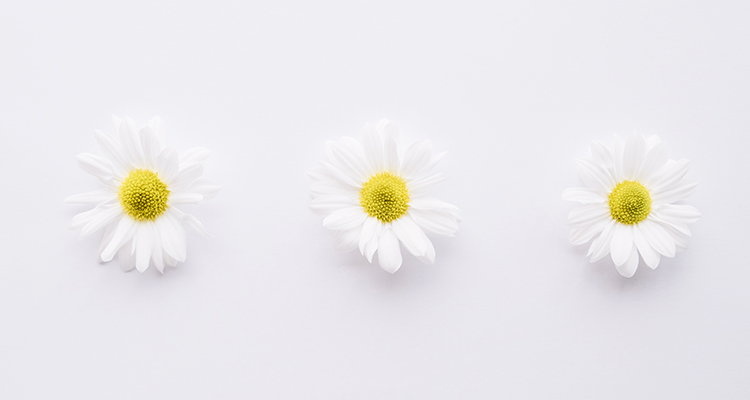
Are chamomile and manzanilla tea the same?
You may have heard the word “manzanilla” used to refer to the chamomile plant. That’s because “manzanilla” is the Spanish word for chamomile. So, yes, these words are sometimes used interchangeably to describe the same sweet and fragrant flower.
Does chamomile tea taste good?
If you enjoy tea that has a mild, sweet, and fruity flavor, then you’ll love the mix of floral and apple undertones of chamomile. You can purchase chamomile tea on its own or as the featured ingredient in a variety of other tea blends, all of which can offer health benefits including relaxation and improved sleep quality.
Does chamomile tea contain caffeine?
Like many other herbal teas, chamomile is naturally caffeine-free, which is one reason it’s a popular choice for inducing sleep. Enjoyed approximately 60 minutes before bed, chamomile tea can be the perfect natural sleep elixir to help ease those sleepless nights.
Treat Yourself to a Soothing Cup of Chamomile Tea
If you’re looking for a relaxing nightcap, skip the alcoholic beverage (which can actually disrupt your sleep) and brew yourself a nice hot cup of chamomile tea. Not only does chamomile act as a mild tranquilizer and sleep-inducer, but other added health benefits can help ease symptoms of common insomnia triggers including anxiety, gastrointestinal complications, and even the common cold.
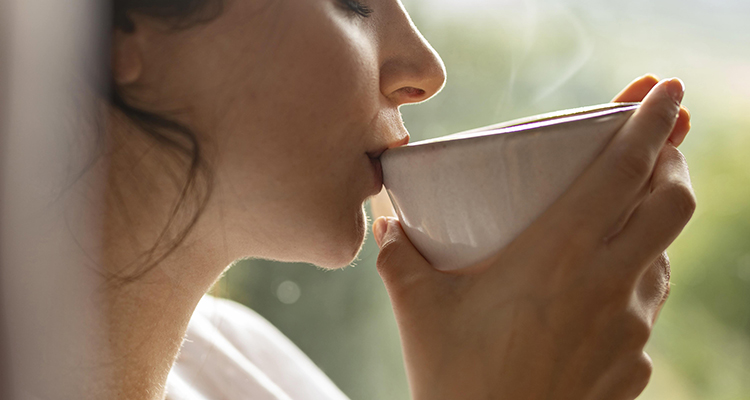
Chamomile tea isn’t the only healthy sleep additive you can use to combat insomnia and other sleep disorders. Practicing cognitive behavioral therapy for insomnia (CBT-i) is proven as an effective, natural way to improve your relationship with sleep and your sleep quality. Click here to learn more about how CBT-i works and how it can change your life.















